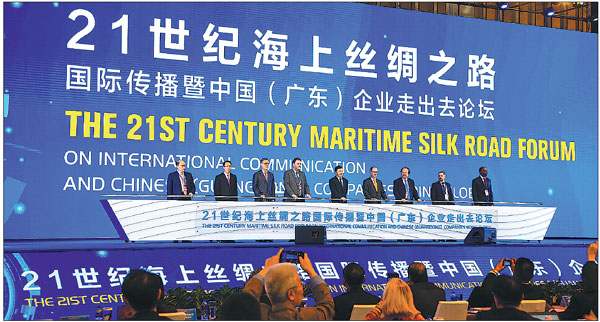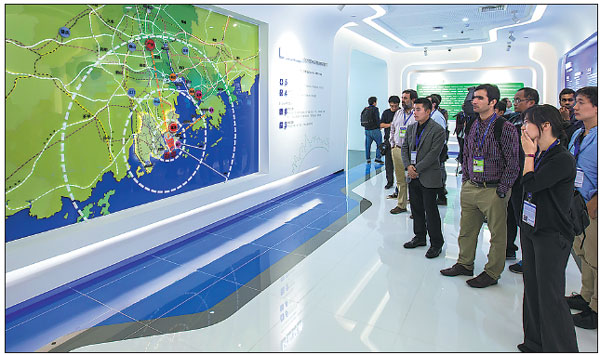Forum highlights companies' efforts to go global

Zhuhai event draws attention to city's key role in province's growing influence along the Belt and Road routes
Guangdong province, where China's opening-up policy was first implemented, has established a closer relationship with Belt and Road Initiative-related countries and regions in terms of foreign trade, investment, technology, culture and tourism.
Officials, academics entrepreneurs and media leaders reached that consensus when attending the 21st Century Maritime Silk Road Forum on International Communication and Chinese (Guangdong) Companies Going Global, held in Zhuhai last Wednesday.
Shen Haixiong, head of the Guangdong Provincial Publicity Department, said the province has attached great importance to cultural exchanges and cooperation over the years, which has enhanced understanding and trust in the global community.

Local government officials and representatives from around the world attend the 21st Century Maritime Silk Road Forum on International Communication and Chinese (Guangdong) Companies Going Global in Zhuhai, Guangdong province. [Photo Provided to China Daily]
The provincial government launched a series of tours and exhibitions to Russia, Germany and Belgium earlier this year to display Guangdong-branded products, such as drones, virtual reality devices and smart home appliances, to promote cultural and trade exchanges.
"Enterprises in Guangdong province are actively participating in the Belt and Road Initiative and pursuing overseas markets, which not only promotes their transformation and upgrade, but also instills new energy into Guangdong's open economy," said Zhang Jincheng, a research center official of the State-owned Assets Supervision and Administration Commission of the State Council, or SASAC.
Bernard Dewit, chairman of the Belgian-Chinese Chamber of Commerce, said the Belt and Road Initiative has the potential not only to benefit its neighboring countries but also to bring new opportunities to the European economy, such as improving employment, increasing wealth and promoting development.
Limburg, a province in Belgium, has witnessed frequent interaction with its twin province Guangdong over the past two years, by mutually dispatching political and business delegations, and via media tours, concerts and photo galleries, said its Vice-Governor Jean-Paul Peuskens. As a result, both sides have signed a package of agreements in terms of education and tourism, he noted.
Solomon Rutega, consul general of the Ugandan consulate in Guangzhou, said African countries have been important destinations for Chinese companies going global under the framework of the Belt and Road Initiative.
He said Uganda would step up its collaboration with Guangdong in industrial connectivity, production, infrastructure construction and investment, while seeking better complementary opportunities in the sectors of healthcare, tourism and culture.
The forum took the theme of cooperation, communication and value and was sponsored by the Information Office of Guangdong Provincial Government and the Zhuhai government.
It aims to serve as a bridge to facilitate better cooperation between Guangdong and Belt and Road-related countries through dialogue, and to demonstrate Guangdong's sound business environment and social and business achievements.
Exploring overseas
Statistics show that Guangdong's imports and exports accounted for nearly one-fourth of the country's total in 2016, of which more than 20 percent was fulfilled with countries and regions involved in the Belt and Road Initiative.
A report was released at the forum that depicts the efforts of Guangdong-based companies going global via the Belt and Road.
The report was compiled by the Information Office of the Guangdong Provincial Government, the SASAC research center and Guanghua School of Management at Peking University. According to the report, private enterprises in Guangdong are showing greater enthusiasm for investing overseas, which have gradually become the new force of the province's outbound investment.
The percentage of overseas-registered wholly owned subsidiaries and joint-stock enterprises or institutions that were set up by private enterprises in the province began to rise from 87.9 percent in 2011 to 95.4 percent in 2015, the report shows.
Actual foreign investment in Belt and Road-related economies expanded 44.7 percent year-on-year in 2015, 33.8 percentage points higher than the provincial average, it said. Growth of the region's investment in Indonesia, Vietnam, India and Pakistan reached more than 100 percent on an annual basis in the same year. Investment in Indonesia, for example, reached $134 million in 2015, representing a four fold increase from the previous year.
As of the end of 2016, 8,957 nonfinancial enterprises were set up in more than 100 countries and regions by Guangdong enterprises. Among them, 884 were established through agreements with economies along the Belt and Road routes.

Participants of the forum visit the Hengqin Free Trade Zone for startups and innovators.
"These companies are making contributions to the local communities they are investing in by improving infrastructure, increasing employment, promoting technological upgrades and practicing ecological civilization," Zhang of the SASAC said.
However, he added that the global industrial structure is undergoing profound adjustment, as a result of escalating competition led by transnational corporations, which will pose new challenges to Chinese companies that are going global.
"They could encounter risks arising from geopolitics, social or market pressures, law, finance and investment," Zhang said. He added that a globalized talent tool is important to improve core competitiveness in global markets.
Zhuhai is a city adjacent to Macao and is one of the origins of the Maritime Silk Road.
It has unique advantages to become a key hub amid China's new round of opening-up, according to Guo Yuanqiang, Party chief of Zhuhai. These advantages include the completion and operation of the Hong Kong-Zhuhai-Macao Bridge, the establishment of the Guangdong-Hong Kong-Macao Greater Bay Area and the development of Hengqin Free Trade Zone, Guo said when addressing the forum.
chenhong@chinadaily.com.cn
MOST POPULAR
- 1 $39.7 billion worth of deals inked at Airshow China
- 2 China announces tax relief measures to stabilize real estate sector
- 3 A look at China's economy in October, 2024
- 4 Public holiday extension announced
- 5 China's NEV annual production hits 10 million milestone amid global carbon reduction efforts
Editors' Picks
 Infographic:
A look at China's economy in October, 2024
Infographic:
A look at China's economy in October, 2024
 Infographic:
G20 at a glance
Infographic:
G20 at a glance
 Video:
Peru sees new port open
Video:
Peru sees new port open
 Infographic:
China's public holidays for 2025
Infographic:
China's public holidays for 2025
 Infographic:
Basic facts of APEC
Infographic:
Basic facts of APEC


